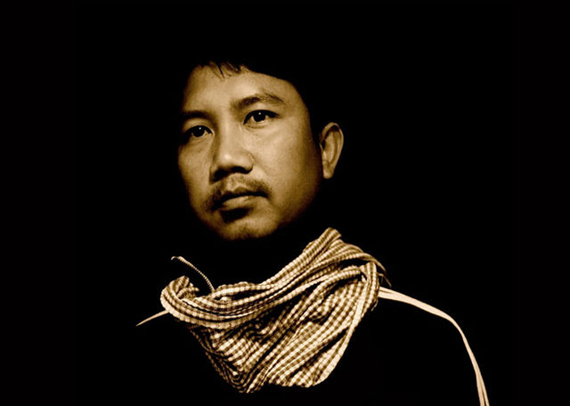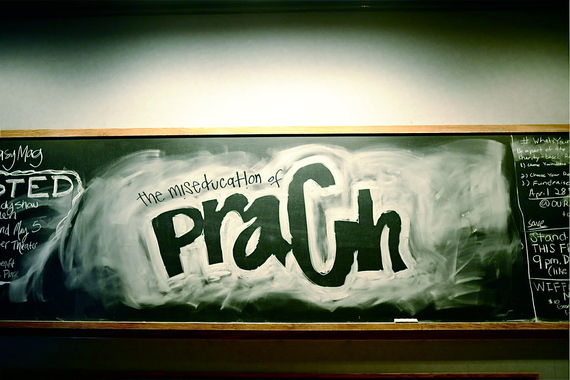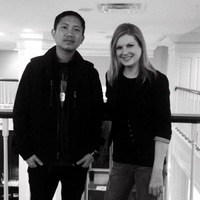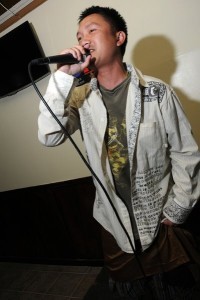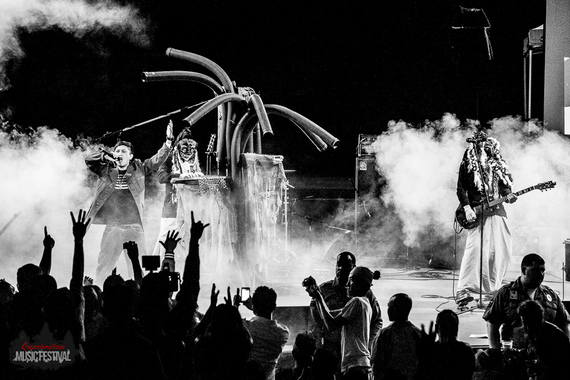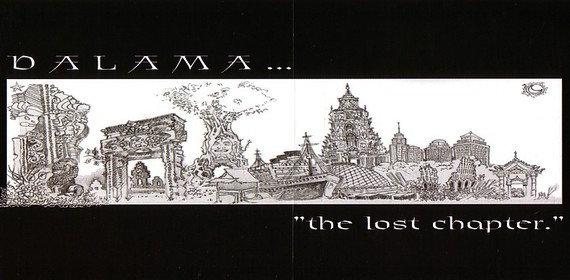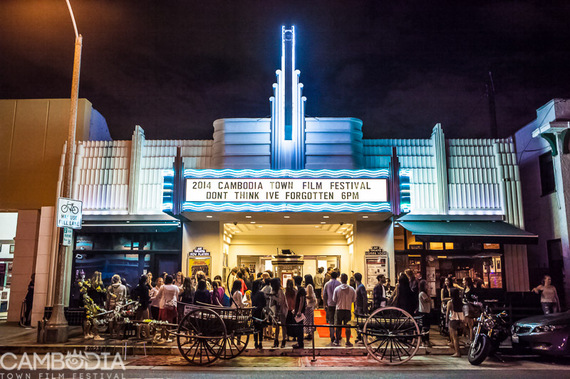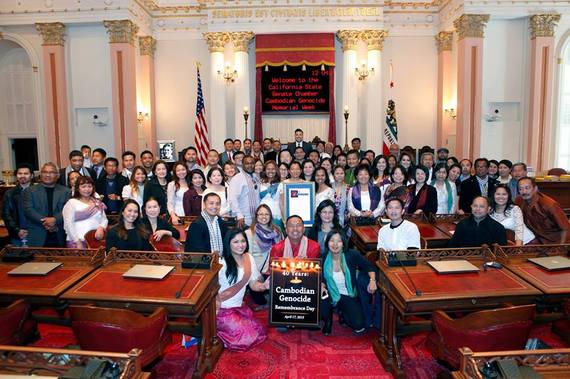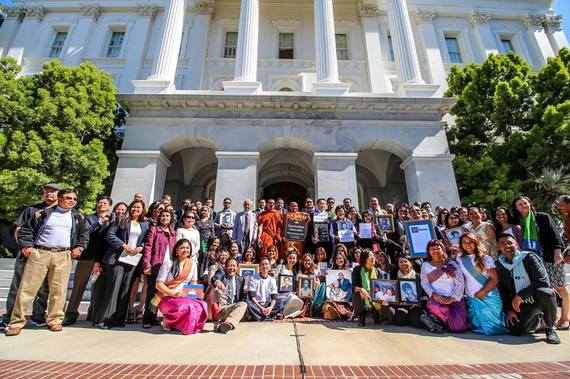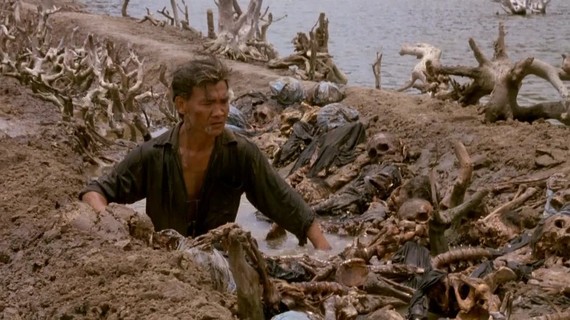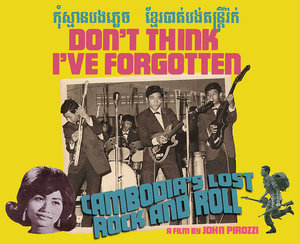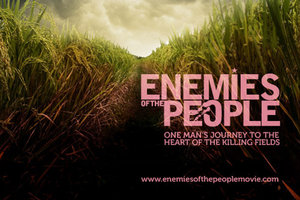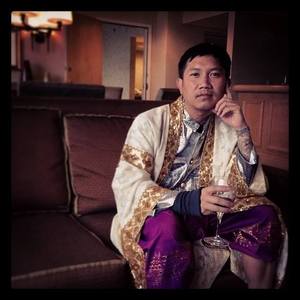With lyrics in Khmer and English and a focus on Killing Fields era legacies, Khmer American rapper praCh Ly's first album, Dalama, was not only credited with introducing hip-hop to Cambodia--it introduced this history to a new generation largely unaware of its genocidal past.
praCh Ly was recently in Houston with friend and filmmaker Caylee So (both are Festival Directors on the committee for the Cambodia Town Film Festival in Long Beach, CA). I met with praCh after he had given a lecture and performed at Lanier Middle School. (He was later told that he'd been the first and only rap artist to perform in their school.)
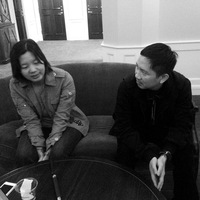 [Note to editor--caption: Left: Caylee So and praCh Ly, Festival Directors of Cambodia Town Film Festival. Right: praCh Ly and Lauren Kruczyk, interviewer.]
[Note to editor--caption: Left: Caylee So and praCh Ly, Festival Directors of Cambodia Town Film Festival. Right: praCh Ly and Lauren Kruczyk, interviewer.]
I sat down with praCh to learn more about his story, what inspires him and how he intends to bring truth about The Killing Fields to a population largely unaware of the atrocities that occurred in Cambodia in the 1970s.
So I read about your background--you got started at a Cambodian New Year's Party in California?
Yes, it was actually a Cambodian New Year's Celebration in Long Beach, California. And it's Cambodian New Year actually, so happy New Year!
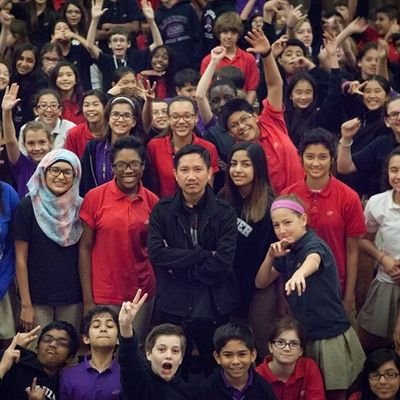 [Note to editor--caption: praCh after lecturing and performing for the students of Lanier Middle School in Houston.]
[Note to editor--caption: praCh after lecturing and performing for the students of Lanier Middle School in Houston.]
Thank you! Happy Cambodian New Year to you as well!
Yea, Happy New Year! We do it for like two weeks. And then right after this we get back on Sunday and have the Cambodian New Year Parade in Long Beach. So we take over the whole mile and a half strip on Long Beach. One of the main streets, on Anaheim Street.
Are there any other cultural celebrations you do in addition to the parade?
There's the parade and then there's the Cambodian New Year's Celebration on April 25th at El Dorado Park. The parade expects around 20,000-50,000 people in attendance. The park is around 10,000-15,000 people in attendance.
So when did you do your original concert?
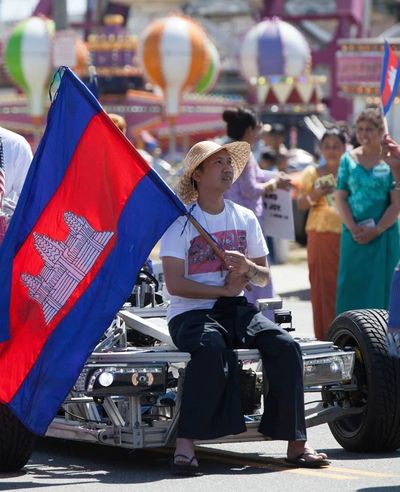
[Note to editor--caption: praCh celebrating the 2015 Cambodian New Year Parade in Cambodia Town of Long Beach, CA.]
I think around '99 or 2000. I think early 2000. I just did a concept album where I was mixing and recording in my parent's garage, using old stereo and karaoke equipment. It was for fun, I didn't expect anything out of it.
And then I just passed it out for Cambodian new year--that following weekend was Cambodian New Year. I passed it out and the DJ got ahold of the CD. He took it to Cambodia and just played it over and over again. People kept requesting it and he was the only one who had the CD. So he just went ahead and made massive bootleg out of it and sold it.
That's what is so interesting to me! It became very popular in Cambodia, unbeknownst to you. When did you find out that a huge population was into your music that you didn't even know about?
I didn't find out until about 3-4 months later when I got a call from Asia Week. And Newsweek called. Asia Week did an article, but I didn't see it until I was on my plane ride to Cambodia. But Adam Piore of Newsweek called up and wanted to talk to me, and I thought it was a joke at first! So, when he first called I hung up on him. [We laugh]. No seriously! Because I thought my friend was playing a joke on me!
His thing was, "May I speak to praCh?" I said, "Yes, this is me." And the first thing he said was, "How does it feel to have the number one album in Cambodia?" I'm like, what?! And you know, my friends, they always play jokes and stuff...
And then he called again and he was really serious. He said, "Look, I'm in Cambodia right now but I'm going to fly into New York and if you'd like to do an interview, I'd like to hear your side of the story." And within a week he flew from Cambodia and met me in California, in Long Beach, and he did the story. "Hop Hop About Pol Pot." And the rest was history...
But it was an accidental success. I just wanted to tell my side of the story. Hip-hop was evolving so much in my environment. But the Asian community was misrepresented. We would stand around seeing people, you know, doing hip-hop, like a DJ breakdancing. And then there's the battle scene, with the DJs going back and forth. But we were the outsiders looking in.
But one day I just figured I had something to say. Then we stepped into the circle--the arena, as they call it. I lost many times, but then, it wasn't about losing. It was the experience. But then it does feel good to win once. Like, out of 800 times. [Laughs].
When you are doing something so unique with the message you are trying to spread and the type of performance you do.... I would think some people might not really "get it" at first or may have preconceived notions about what you're trying to accomplish. I think it takes a while for people to really understand, and for you to build a following.
Yea, I mean, the best thing to do for an artist or a musician--specially for a rapper--is to get your friends involved and your following from your neighborhood. I started to see that. I started to see my friends getting more involved in the music scene. Now I'm recording at home, and they're coming over.
It's good to have support from people who actually know you. Because when they are spreading the word, they can explain what it is about you that's special rather than just passing the word around without offering any sort of explanation about who you are or why this is important. The people close to you will be more passionate about it. It comes across more real, more genuine. Like, "Hey, you HAVE to listen to this. Because it's amazing."
Yea, I was very nonchalant too, in the beginning. When we were recording, 25% was written, and the other 75% was freestyling, just speaking my mind. And there was a lot of alcohol and marijuana involved...but that's all a different story! I'm clean now though, so it's all good.
Great to hear! So at this point, do you have two albums or three?
Solo albums, I only have one. Actually, two. Because the first one I didn't really call an album, it was more of a demo. Like a mix tape. Then I finally I saw the impact of it. Because after the first album I took a bit of a break. I went behind-the-scenes and started helping out with the Cambodian community. Because of the popularity of the songs on the album, I would start getting requests to do shows. And then I was meeting with council members, I was meeting with mayors. I started to hear problems from the community.
And in 2001 we had to call off our Cambodian New Year Celebration. It was a huge upset for the community because we felt like we were being discriminated by the Long Beach Police Department.
Would you say it was a backlash from the community? People feeling upset or wanting to prove a point? Thinking, "You did this to us, so now we're going to cancel the whole thing"?
No, they wanted a lot of...there were a lot of officers that controlled this park. And we felt like it wasn't a celebration. We felt like we were prisoners. And we said we should probably call off the police -- we didn't want to pay for fifty-five police officers and highway patrols, and then have to get our own personal private security. I didnt know about that until we got into all these council meetings. Then the community members decided to call it off, to take a stand against the city.
After that, I became really vocal, attending the meetings and such. Then 2002 came, and they--the committee--asked me if I wanted to be a coordinator for the New Year's celebration. At the time, I had no idea what a coordinator was for this kind of event.
Sounds like a lot of responsibility!
I didn't know what i was getting into! But they promised me that whatever I needed, they would help guide me through it. So I took that responsibility and I put my album to the side. I got involved with the community a lot. And then a year, two years later, I released my 2nd album, which is Dalama..."The Lost Chapter." From that, me and my friend put together a tour with some musicians and filmmakers. Within that year we toured about 24 states throughout the United States.
What was that like for you?
It was a very eye-opening experience for me. Because, before the tour, I was still working at this karaoke shop where I was selling CDs. The owner (he kind of co-owned it with me), said, "I know you have something going on out there, and you don't belong here. You need to go out there. Do what you need to do. But when you come back, I can't guarantee you a job."
I thought about it and, at that point, I knew I needed to leave. He couldn't maintain the shop so he ended up selling it and going to live in Cambodia. When I went to Cambodia I saw him. It was a really surreal moment, but it was good. Really good.
That's pretty amazing that you were able to see him again.
After the second album, I kind of took a backseat again to see what was going on in the community. And then I just started working on films. That's how I got to meet a bunch of filmmakers (including Caylee So, fellow committee member also featured in above photo).
During The Killing Fields, they killed off, or at least tried to kill off, all musicians and artists. All the "elite" groups.
Lawyers doctors, anyone who was intelligent or "looked intelligent." Teachers...if you had glasses, they would kill you for the revolution. From 1975-1979, 1/3 of the population was either murdered or starved to death.
I've read that many Cambodians didn't know that this had happened, which is why your music became so popular. These people felt like they had been in the dark for so many years, and were finally privy to the truth when they heard your music. I'm sure it was shocking to the younger generation.
If you want to put it in perspective to right now - 70% of Cambodians in Cambodia right now are under or at the age of 35.
So the war started in 1975, and it's the 40th year anniversary this year. We're celebrating with the Cambodia Town Film Festival in California [taking place Sept. 3rd-6th in Long Beach, CA].
How did The Killing Fields affect you and your family?
My family was evacuated into farmland, separated and divided by sex and age into different camps. I didn't know about the story -- I heard my mom talk about it briefly but she didn't get into descriptive details because she was still dealing with post traumatic stress.
I got into trouble at Long Beach and was sent to stay with my brother in Florida, my older brother. And he just opened my eyes to The Killing Fields. It's barely even taught in school textbooks.
[Note to editor--caption: On April 16th, 2015, California's Senate unanimously passed the Senate Resolution #21 (SR-21) declaring April 13th-17th as 'Cambodian Genocide Memorial Week,' calling for all of California to recognize, remember and celebrate the resiliency of the Cambodian spirit in the face of terror and genocide.]
America had a huge deal on it too. They were doing secret bombings on the Ho Chi Minh Trail. Over 250,000 innocent Cambodians were killed during the bombing. Farmers...losing their lands and homes because of the bombings, because some guy with an idea [Pol Pot, leader of the Khmer Rouge] says the Cambodian government isn't doing anything, so let's uprise! Let's take over! Then we can do it our way.
At what point did you feel like you wanted to be involved, or wanted to educate people about the atrocities that had happened?
I never felt like I was educating people about it, I just wanted to tell my story. I never set out to lecture people about anything. All I'm doing is telling my story.
If you listen to my album, each song is like a 4 minute movie. I'm telling my story, and if you can relate to it, perfect. And if you can't, you know what...everyone has their own story.
Hip-hop was always around me as a kid. But when I started off, I wasn't rapping about The Killing Fields. I was rapping about guns and drugs, glorifying myself. I wasn't really on the right path. Before the first album, I got caught up into some gang activity in Long Beach. So I was sent to stay with my older brother.
When I stayed with my brother, he opened my eyes. I look at my brother like a role model. He's a strong figure to me. I've never seen him cry or anything like that. Before, he had never really talked much about it.
When I went to stay with him, the second week he just opened up to me. And he was telling me about the times he had tried to escape from the camp each night, and it was like a death sentence if you got caught leaving the camp. But he was so hungry, he had no choice. Either he could stay there and die, or go out and look for food.
And he was telling me about all these corpses he saw, these bodies...the people he saw killed. And he shed some tears. Those tears just hit me hard that night. So the next day I went to the nearby library (because back then there was no internet or Google or anything like that). And I started doing research.
That weekend I started writing rhymes and then eventually I felt like I should go back to California and start making music again. At the time, I couldn't afford studio time. So I lived in my parent's garage. They had all these old amps and speakers and karaoke stuff that they weren't using so I just put it together and used it to record.
In terms of your family, what is your brother doing now? How are your parents? What are they doing and how do they feel about your work?
My brother's a business owner in Florida. My mom is well. My dad just recently passed away last year.
I'm so sorry. That's really hard... How did you deal with it?
If he was going to die, he wanted to die in Cambodia. So when he was really ill, we advised him to come to America to seek treatment. And he said, you know, I'm not going to make it. And, you know, he had his wish, so...
Were you able to see him before he passed?
Unfortunately, I did not. My brother and sisters took a trip to see him before he died. And when they went, the doctors said he was okay, he was looking better. And one day we just got a phone call...and he was gone.
And all of this was in the midst of us doing the film festival. I had to put on this mask where everything was happy.
That's a lot to deal with.
It was, but I was ok. Last year was one of our biggest years for the Cambodian Film Festival. And we highlighted survivors, Cambodian survivors, in a film called Don't Think I've Forgotten. It's about the Cambodian loss of rock-and-roll. One of the survivors--he's one of the original band members--played for us after we screened the film. And everyone was in tears, just seeing him play. It was surreal though, it was a beautiful moment.
Very powerful. I'm sure that had a huge impact on everyone who was there to witness it.
Yes, it was very powerful. I dedicated the 2014 film festival to my dad. He is a lover of art and culture and knowing that we are doing our best to preserve it would make him proud, and that is all I want to do is to make him smile and be proud.
In terms of your performances, where are you now? Have you been touring?
We're testing the waters. Like music on films, on soundtracks and such. But I haven't really done an album, so this is kind of like a testing ground to see what happens.
Plus we have the Cambodian New Year coming up, with all the performances. But I rarely do performances. These days I'm always surrounded by filmmakers, award-winning filmmakers. And they'll ask me to do a music video. But for some odd reason I don't want to make one. Even to this day, I've never made a music video. I just want the music to be self-explanatory.
That makes sense. Sometimes words are more powerful than anything else.
Well, for example, there's a film called Enemies of the People. And it was shortlisted for the Oscars. And I did a song for it. The director was trying to convince me to do a music video for it. But in the end I said no, and I asked him if he could use footage from the film instead. And it turned out really good! The song was like a mini-movie of the movie. Like a trailer of the movie.
Maybe one day I'll make a music video. I don't know. I don't see it happening right now.
Do you think your hesitation is rooted in perfectionism? For example, you have so much emotion attached to this story. It's your history. Are you afraid that you won't be able to do it justice in that particular way, through that outlet?
I like the creative side. For me, it's about the creativity. Now you watch rap videos and you see these people dancing on screen, shaking their fingers and it doesn't mean much. I like the narrative part.
Usually when I do shows I just say, "Turn off the cameras." Just enjoy the moment, you know?
Yea! Like, don't worry about putting it on Facebook or Twitter or whatever. Just watch. Get something out of it.
Yea, just watch and enjoy the moment.
When I was in Cambodia, I actually wanted to film. And I came with the camera to film with these legends and artists in Cambodia. One of the artists sat down next to me and said, "So are you enjoying this on the screen or are you enjoying this in the moment?"
And then I realized what he meant and he's right. You should just embrace the moment and enjoy it.
I think in our generation, with social media being so prevalent, it's a surprisingly hard thing to do. But it's important. Otherwise, the focus is not on the idea. The focus becomes about you, yourself, your followers...It indulges that need for attention certain people might be somewhat addicted to at this point. And it ruins the moment.
Exactly. If you want to film, just put the camera there but still watch and enjoy it. Because it might not happen again.
You're one of the Festival Directors on the Cambodia Town Film Festival Committee. Can you tell me a bit more about the Cambodia Town Film Festival and the history behind it?
In The Killing Fields, they literally burned books and films and what was left was almost nothing from cinema. And in the 60's and 70's, films were on the rise in Cambodia. Some had even reached international audiences. And after the war, everything was destroyed.
So we find it within ourselves to create this platform. Some Cambodian films, even though they submit them to these film festivals, get overlooked. For this reason, we wanted to create a platform for independent filmmakers to showcase their films, have more access to an audience on a broader scale.
We chose September because September is like the fresh start of Hollywood awards season, and that's when those small indie films need that extra word of mouth to get out there, draw some attention. Make some noise.
And they will be making noise! This year, the festival has many great things in store for everyone attending the event. Purchase your tickets here for the 3rd Annual Cambodia Town Film Festival Sept. 3-6 at the Art Theatre in Long Beach, CA.
Wanna know more about the Cambodia Town Film Festival?
"CTFF is a four-day film forum that will introduce new studio and independent features, documentaries, foreign features, short films, animated shorts and re-released classics. The programs will include a variety of special events and panel discussions featuring directors, producers, writers and actors. CTFF will provide a creative forum for emerging filmmakers. CTFF offers the opportunity for student early-career filmmakers, and seasoned filmmakers to showcase their talent and gain exposure.
One of the key purposes of Cambodian Town Film Festival (CTTF) is to highlight the diversity of the Cambodian experience through the art of filmmaking. By specifically featuring films that deal with Cambodian social political conflicts, traditions, challenges and characters, the Festival will deepen Cambodian values and encourage new dialogue on a global scale.
This year, the festival will also aim to showcase an international selection of narrative features, documentaries, short films, student films, animated films from (not just Cambodia), but from around the world, bringing stories to Cambodia Town, Long Beach, California."
Special thanks to praCh Ly for his time and for sharing his story so candidly.
Originally posted here. Article written by Lauren Kruczyk.
